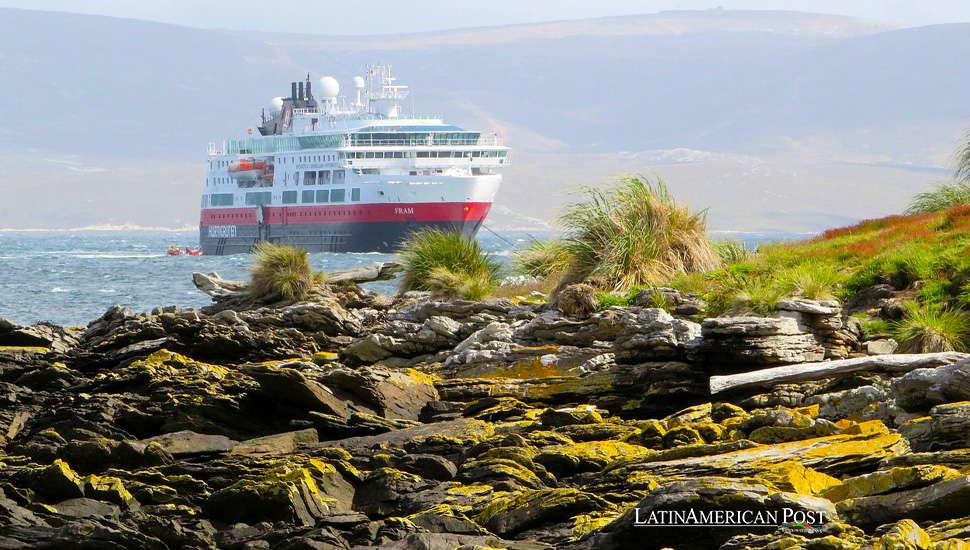Cameron’s Plan to Visit Falkland Islands Highlights Enduring Tensions with Argentina and Regional Implications

British Foreign Minister David Cameron’s upcoming tour of the South Atlantic, including the Falkland Islands, underscores the lasting legacy of the 1982 conflict and its implications for UK-South American American relations amidst ongoing sovereignty disputes.
Reasserting Sovereignty: Cameron’s Visit to the Falkland Islands
In a move that is sure to draw international attention and potentially stir longstanding tensions, British Foreign Minister David Cameron is set to visit the Falkland Islands as a crucial part of his inaugural tour of the South Atlantic and South America. This visit not only reasserts the United Kingdom’s stance on the sovereignty of the Falkland Islands but also highlights the enduring complexities of post-colonial legacies and regional politics in South America.
The Falkland Islands, a remote archipelago in the South Atlantic, has been a point of contention between the United Kingdom and Argentina for decades, culminating in a brief but intense conflict in 1982. Despite the war ending in a British victory, the question of sovereignty over the islands remains a sensitive issue, with Argentina continuing to claim the territory as its own. Cameron’s visit is symbolic of the UK’s commitment to the islands, which he describes as “a valued part of the British family,” underscoring that their sovereignty “will not be up for discussion” as long as the islanders themselves wish to remain British.
Cameron’s stance reflects a broader trend of former colonial powers grappling with their historical legacies, particularly in regions like Latin America, where the echoes of imperialism are still felt today. The Falklands dispute is more than a bilateral issue between the UK and Argentina; it touches on themes of self-determination, national identity, and international law, themes that resonate across the globe but have particular significance in Latin America due to its colonial past.
Diplomatic Challenges: Cameron’s South American Tour
The Foreign Minister’s tour, which will also include stops in Paraguay and Brazil for the G20 Foreign Ministers meeting, comes at a time when South American countries are increasingly asserting their independence on the world stage and seeking to address unresolved issues stemming from their colonial histories. Cameron’s visit to the Falklands and subsequent engagements in South America thus occurs within a complex matrix of historical grievances, regional solidarity, and the shifting dynamics of global power.
Argentina’s renewed push for negotiations over the Falklands’ sovereignty, despite British resistance, is indicative of the broader movements within Latin America towards reevaluating and often challenging historical narratives imposed by colonial powers. This is seen not only in diplomatic arenas but also in cultural and social spheres, where there is a growing emphasis on reclaiming and reaffirming indigenous and local histories and identities.
Moreover, Cameron’s visit underscores the strategic importance of the Falklands and the South Atlantic region. The islands serve as a critical military and logistical outpost for the UK, reflecting broader geopolitical interests that extend beyond the immediate question of sovereignty. This aspect of the Falklands dispute highlights the ongoing interplay between historical claims and contemporary strategic considerations, a dynamic that is not unique to the Falklands but can be seen in territorial and maritime disputes across Latin America and the Caribbean.
The reaction to Cameron’s tour, both within the UK and across South America, will likely mirror the complexities of the Falklands dispute itself. For many Britons, the visit will be seen as an affirmation of national sovereignty and a tribute to the personnel who served in the 1982 conflict. For Argentinians and others in the region, however, it may be perceived as a provocative assertion of colonial-era claims, potentially fostering solidarity among South American nations around the principle of regional autonomy and resistance to perceived external intervention.
Significant Diplomatic Implications
The diplomatic implications of Cameron’s visit are significant, with potential ripple effects on UK relations with not just Argentina but other South American countries. The stance taken by the UK on the Falklands issue can serve as a barometer for its approach to international law, sovereignty disputes, and engagement with former colonial territories. Similarly, the response from South American nations will reflect their positions on these issues, potentially influencing broader regional dynamics and alliances.
As Cameron prepares for his tour, the international community will be watching closely to see how this visit will impact the delicate balance of interests in the South Atlantic and beyond. The Falklands dispute, while rooted in the specific historical context of British colonialism and Argentine sovereignty claims, speaks to broader themes of national identity, self-determination, and the legacy of colonialism—themes that resonate far beyond the shores of the contested islands.
Also read: Argentine Justice Orders Eviction of Illegally Occupied Military Lands in Bariloche
David Cameron’s visit to the Falkland Islands is not just a diplomatic gesture but a symbolic act that encapsulates the enduring challenges of reconciling historical legacies with contemporary geopolitical realities. As the UK and South American nations navigate these complex waters, the lessons of the Falklands conflict and its aftermath remain as relevant as ever, reminding us of the importance of dialogue, respect for international norms, and the pursuit of peaceful resolutions to sovereignty disputes.





